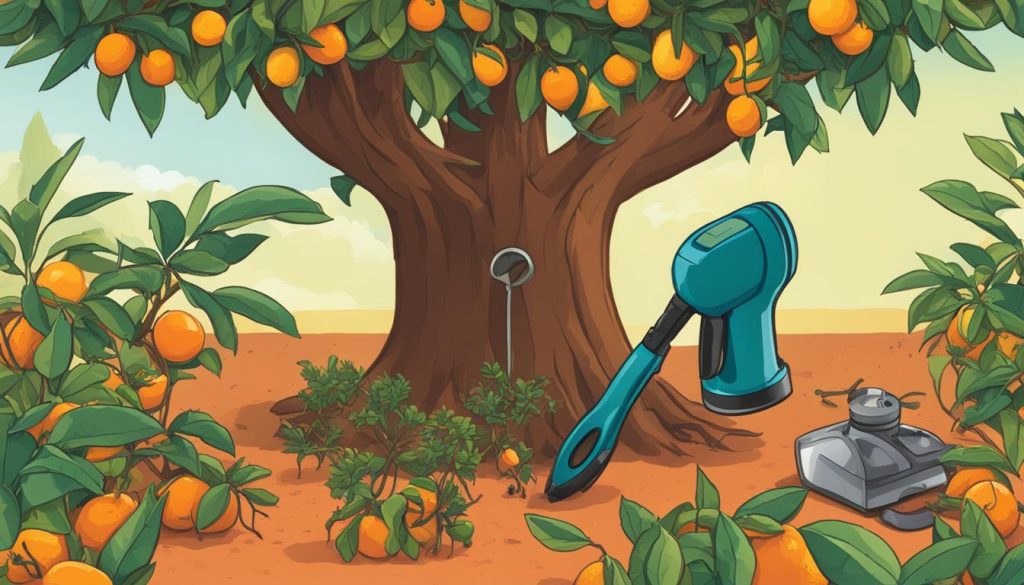G’day, mate! If you’ve spotted some pesky ants on your citrus trees, you’re not alone. Ants can be a real bother, but don’t worry, we’ve got some ripper tips that will have you saying ‘hoo-roo’ to those little critters in no time. No need for harsh chemicals, we’re talking about safe and clever ways for ant control in citrus trees that are easy as pie.
Whether you’re trying to figure out how to get rid of ants on citrus trees or you’re hunting for the best ant killer for citrus trees, these nifty tricks will help protect your leafy mates from unwanted guests. Let’s keep those trees healthy and ant-free!
Ant Control For Citrus Trees
Ants can be a nuisance for citrus trees, but there are effective methods for controlling them and protecting your trees. Here are some key strategies:
- Eliminate Ant Hills: Prevent ants from infesting your citrus tree by eliminating their anthills.
- Bait Traps: Use bait traps to attract and trap ants away from your citrus tree.
- Sticky Traps: Place sticky traps around the base of the tree to capture crawling ants.
- Remove Food Sources: Ants are attracted to sweet honeydew secreted by aphids and mealybugs. Remove these pests from your tree to reduce ant attraction.
- Organic Pest Control: Consider organic pest control methods to keep ants off citrus trees, allowing natural predators to control harmful pests.
- Tanglefoot Barrier: Create a barrier around the trunk of the citrus tree using “tanglefoot” to prevent ants from climbing.
- Effective Sprays: Use effective sprays to deter ants from your citrus tree.
- Hydrogel Beads: Some researchers have developed ant control methods using hydrogel beads soaked in bait and poison.
- Citrus Oils: Citrus oils such as orange and lemon oils can be toxic to ants. Use them to deter ants from citrus trees.
It’s important to note that different ant species may infest citrus trees, so it’s essential to identify the specific ants and choose the appropriate control methods. Additionally, keeping ants off citrus trees is crucial to protect against citrus pests like aphids and mealybugs.
Sources:
Understanding Ant Infestations in Citrus Trees
To successfully tackle an ant infestation in citrus trees, it’s important to get to know the culprits behind the havoc. Different types of ants favour different citrus trees, and understanding their habits and preferences is the first step in preventing ants on citrus trees. A holistic approach, combining identification and targeted strategies, can provide organic ant control for citrus trees without resorting to harsh chemicals.
Common Ant Species Affecting Citrus Trees
In Australia, we frequently encounter a few key ant species in our citrus orchards:
- Argentine Ant
- Native Gray Ant
- Southern Fire Ant
These ants are not just slight nuisances but can significantly disrupt the ecosystem of a citrus tree’s environment.
The Relationship Between Ants and Sap-Sucking Insects
The alliance between ants and sap-sucking pests like aphids and scales is troubling for citrus trees. The ants feed on the honeydew these insects produce, and in return, they offer protection from natural predators. This symbiotic relationship allows pest populations to flourish and can severely affect tree health and fruit production.
Impact of Ants on the Health of Citrus Trees
Ants can be more than just a minor annoyance. They have the potential to inflict serious harm upon citrus trees:
- Ants like the Southern Fire Ant can severely damage blossoms and young fruits.
- In extreme cases, they can strip the bark and girdle young trees, leading to their death.
Understanding the extent of damage ants are capable of underscores the need for effective management strategies to protect these valuable trees.
| Ant Species | Characteristics | Impact on Citrus Trees |
|---|---|---|
| Argentine Ant | Highly social, builds extensive colonies | Assists in aphid and scale infestation |
| Native Gray Ant | Adaptable, often found in urban areas | Feeds on honeydew and protects sap-suckers |
| Southern Fire Ant | Aggressive, omnivorous scavenger | Can cause physical harm to trees and fruits |
Utilising this knowledge, we can create tailored control measures to keep our citrus trees healthy and productive while employing organic ant control methods.

Ant Control Citrus Trees: Identifying and Blocking Entry Points
Winning the battle against ants in your citrus trees involves a keen eye and some clever DIY strategies. DIY ant control citrus trees starts by figuring out what’s luring the ants. It’s often the sticky honeydew from pesky aphids or the sweet nectar from the blossoms themselves. So, here’s how you can stop them in their tracks:
- Give your citrus trees a bit of a haircut by pruning lower branches, so they stand a good 30 inches above ground. This makes it harder for ants to just waltz up the tree.
- Wrap the trunk with a tree wrap and slap some Tanglefoot on there. It’s a sticky barrier that ants can’t cross, acting as the perfect ant deterrent for citrus trees.
- Keep branches from getting too chummy with their neighbours. If they’re touching, ants can easily hop from one tree to another, so regular pruning will keep them at bay.
If you do turn to the chemical cavalry, make sure to follow instructions meticulously. It’s all about keeping you and the environment safe while you zap those ants.

In summary, safeguarding your citrus trees from ants doesn’t need to be complicated or harmful to mother nature. A few straightforward steps and you’ll have an ant-free zone where your citrus can thrive blissfully.
Natural Ant Repellents and Organic Solutions
Guarding your citrus trees against ants can be quite straightforward and safe when you opt for natural ant repellents and organic methods. These options not only keep your backyard healthy but also take care of the environment. Whether your garden is just for your family’s enjoyment or part of an organic orchard, the tricks we’ll share can help in maintaining a harmonious natural balance.
Essential Oils as Ant Deterrents
Essential oils are a top pick when we speak about natural ant repellent. Notably, peppermint and spearmint oils are the scents that ants like least. Mixing these oils with water can create a spray that will send the ants packing. Just a few spritzes around the tree, and you’ll notice fewer ants lurking around your precious citrus. It’s simple, smells nice, and is kind to the planet.
Using Vinegar and Citrus-Based Mixtures
Vinegar isn’t just for your fish and chips; it can also be a potent ally in the fight against ants. By combining vinegar with a squeeze of lemon and a bit of garlic, you can whip up a concoction that ants will avoid. This mixture creates a scent barrier, which is a brilliant organic ant control for citrus trees. If by chance the rain washes it away, just whip up another batch and reapply.
Water as a Simple and Effective Ant Control Method
Honestly, sometimes the best solutions are the simplest ones. Grab your garden hose and give those ants a good shower. Regularly blasting them with water also clears away the honeydew that they’re so attracted to. Although it might seem too easy, a quick spritz can be quite effective. Just remember, persistence is key!
So, there you have it, a few little tips to keep your citrus trees ant-free and your garden as organic as can be. Give these methods a go and see your trees thrive, all the while knowing you’re looking after the environment.
FAQ
What are some effective methods for ant control on citrus trees?
Effective ant control methods for citrus trees include using natural ant repellents such as essential oils, specifically peppermint and spearmint, vinegar and garlic solutions, and hosing off ants with water. Other strategies involve physically blocking ant entry points with pruning, tree wraps with sticky substances like Tanglefoot, and maintaining proper garden hygiene to minimize attractants.
Can common household items be used to create natural ant repellents for citrus trees?
Yes, common household items such as peppermint oil, spearmint oil, vinegar, garlic, and even citrus-based mixtures can be employed to deter ants naturally. A spray made with these substances can create a scent barrier that is unappealing to ants, thus helping to protect your citrus trees from infestations.
What are the common ant species that affect citrus trees?
Some of the common ant species that affect citrus trees include the Argentine ant, native gray ant, and the southern fire ant. Identification of these species is vital as they have differing behaviours and impacts on your citrus trees.
How do ants contribute to the damage of citrus trees?
Ants contribute to the damage of citrus trees by protecting sap-sucking insects like aphids and scales that produce honeydew, upon which ants feed. These sap-sucking insects can damage the tree, and in protecting them, ants allow these pests to thrive and multiply. Some ants, like the southern fire ants, can also directly harm the tree by damaging flowers and young fruit or by girdling the bark of young trees.
How can I identify and block ants’ entry points to my citrus trees?
Start by thoroughly inspecting your citrus trees to identify where ants are climbing onto them. Look for ant trails leading to the tree. Pruning lower limbs and maintaining a clearance of at least 30 inches from the ground can help. Wrapping the trunk with a tree wrap and applying a sticky barrier like Tanglefoot is also an effective way to block ant access. Additionally, prune any branches that touch buildings, fences, or other trees to prevent ants from bridging onto your citrus tree.
What essential oils work as ant deterrents for citrus trees?
Peppermint and spearmint essential oils are excellent natural deterrents for ants. When mixed with water or a binding agent like witch hazel, they can be sprayed around the citrus tree, including the base and affected areas, to repel ants effectively.
Can I use water to control ants on my citrus trees?
Absolutely! A strong jet of water can displace ants and also remove the honeydew substance and any sap-sucking insects that might be attracting them. This method is simple and can be a very effective technique in disrupting the ant’s activity and deterring them from setting up a colony on your citrus trees.
Are there any organic solutions for controlling ants in citrus orchards?
Yes, organic solutions for controlling ants in citrus orchards include the use of organic bait stations with boric acid, skirt pruning to remove low-hanging branches, and applying non-toxic sticky materials to tree trunks. These methods prevent physical access by ants and are considered environmentally friendly.






